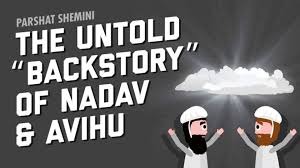Raboyseyee & Ladies,
Three simchas shouts outs this week, here we go.
We begin with mazel tov wishes to our friends Helene & Dr. Larry Sher upon the engagement (last week) of their son Zack (yes, with a ‘k’) to Rena Sidlow, she the beautiful daughter of Drs. Rob and Rachel Sidlow, they of Mt. Vernon. A very special mazel tov shout out to Rena’s grandmother, Dr Monique Katz and wishes of aliyas neshomo to Mordechai Katz whose first yurtzeit will be observed in the coming days. May Rena and Zack merit to enjoy each other in blissful marriage for many decades ahead.
Big mazel tov wishes to our friends Esther and Boruch Weinstein upon the aufruf -this coming Shabbis and wedding next week- of their son Benjamin, who will be marrying Lily Lightman, she the beautiful daughter of Miriam and Ezra Lightman, they of Bergenfield, New Jersey. Mazel tov to the extended Weinstein, Weiss and Lightman families. As always, a special shout mazel tov to Ben’s bubby, Mrs. Bernice Weiss. May Ben and Lily be zoche (merit) to enjoy many decades of very bright light together.
And last but certainly not least, mazel tov to our friends Autumn and Bruce Mael and their entire extended family upon the upcoming aufruf- also this Shabbis and wedding, also next week- of their son Jacob, who will be marrying Kayla Siebzener, she the beautiful daughter of Marci and Nachi Siebzener (still easier to say than to spell). We wish Kayla and Jacob decades of only happiness together.
Somehow, the heylige Ois and eishes chayil will be attending both aufruf’s and look forward to attending and dancing at both weddings.
——————————————————————————————————————–
Fire in the Tabernacle: 2 DEAD!
Shoin, just when you thought we’d be introducing and discussing yet more korbonis and that you’d be bored silly, the heylige Ois -in his role as fire marshal for a day- is here with new information on what happened -and why- to Nodov and Avihu. Avi-who? Oy vey; mamish a shanda that you don’t remember anything from your many years in yeshiva. Aroisgivorfene gelt (your entire tuition money flushed away in the toilet). Yearly, as Parshas Shmini comes around, the heylige Ois is saddened all over again when reading of their untimely passing. The good news: when you get through this week’s review -which as an aside, also features the laws of kosher meat, chicken, fish and more (yes, chicken once had its own non-meat designation -was seemingly parve- but somehow (thank our sages) found its way onto the meat side of the menu- you will not just know Nodov and Avihu, you will never forget them.
Speaking of meat, last week we shouted out and plugged both Chaim Richter of Richter Caterers and Elliot Moskowitz of PRAIRIE PRIME. Why? Because the Ois has had amazing experiences with both, and because time is running out soon for Pesach deliveries to Orlando and elsewhere. Here is plug #2 (again free of charge). If you are Orlando bound this Pesach (who isn’t) and want to enjoy as a true ‘ben-choirin’ (free person), check out Chaim’s menu here: RichterCaterers.com/menu. His Pesach menu is all-encompassing and his food is amazingly gishmak.
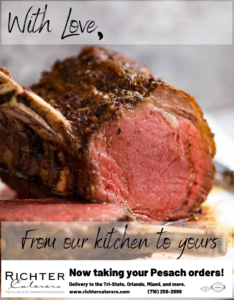
Ober, if, you feel like cooking, broiling, grilling, or BBQing, check out PRAIRIE STREET PRIME. Your order will arrive deep frozen; their meats are prime mamish and amazing! The Ois had one of their steaks just last night. www.prairiestreetprime.com.
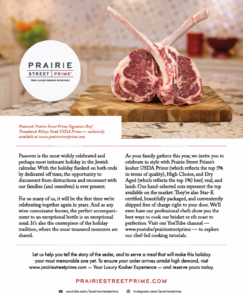
Oh, and let us also do a mitzvah by giving a second plug to the new mikveh being built -ladies only I understand- over in Hollis Hills by the good folks over at Shaarei Zion. More on the mikveh project, next week. If you feel like donating, perhaps you’d like to see your name on the building, or elsewhere, here is a link: https://charidy.com/shaareizionofhollishills/efraimfrankel
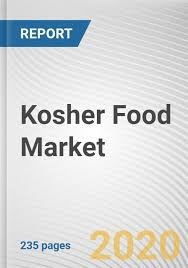 Shoin, before we investigate the fire and why it may have taken place, halt kup (pay attention) as we -once again- pay homage to the RBSO who created the entire kosher gesheft (industry) right here in our parsha. How did it come about? Says the heylige Ois azoy: a shtikel concerned about the livelihoods and general well-being of His people -especially once the munn would stop falling and once they entered the land after forty years of doing nothing, the RBSO taught Moishe all the laws of kosher and non-kosher animals, birds and fish. To solve the pending unemployment issue, He came to their rescue with a stimulus plan by creating a brand-new industry: the world of Kosher! Suddenly there was a need for shoichtim (those who would ritually slaughter), manufacturers, wholesalers, retailers, and other purveyors. They would need storefronts, warehousing, packaging, shipping, and so much more; jobs and entrepreneurship galore. Newly established restaurants created the need for mashgichim, and certifying agencies known mostly by two or three letter names. Think OU, OK, circle k, triangle K, star K, inverted K, and another 1,400 or so names using various letters, shapes and colors to distinguish themselves. Yes, you read that number correctly. Kosher laws were also given to supplement the income of myriad individual rabbis who were suddenly able to moonlight by offering their own personal hashgochois (their certification stamp or seal), with decent pricing. Let’s not forget that certain individual free agent rabbis and rebbes also make a fortune selling your chometz to the unsuspecting goy for a fee. How many times has the Ois told you just how great the RBSO is? Many! But it gets better: following the RBSO’s instructions, our sages of yore came along and added hundreds of others restrictive covenants to the RBSO’s initial instructions. In more recent times, having run out add-on laws, those in the kosher business have found ways to shame us into purchasing more and more kosher sounding products -to include hand-made but broken shmura matzo for $35/lb. The bottom line: the kosher and kosher for Pesach markets are out of control and as a result, the job market for anything kosher food related is never in a recession.
Shoin, before we investigate the fire and why it may have taken place, halt kup (pay attention) as we -once again- pay homage to the RBSO who created the entire kosher gesheft (industry) right here in our parsha. How did it come about? Says the heylige Ois azoy: a shtikel concerned about the livelihoods and general well-being of His people -especially once the munn would stop falling and once they entered the land after forty years of doing nothing, the RBSO taught Moishe all the laws of kosher and non-kosher animals, birds and fish. To solve the pending unemployment issue, He came to their rescue with a stimulus plan by creating a brand-new industry: the world of Kosher! Suddenly there was a need for shoichtim (those who would ritually slaughter), manufacturers, wholesalers, retailers, and other purveyors. They would need storefronts, warehousing, packaging, shipping, and so much more; jobs and entrepreneurship galore. Newly established restaurants created the need for mashgichim, and certifying agencies known mostly by two or three letter names. Think OU, OK, circle k, triangle K, star K, inverted K, and another 1,400 or so names using various letters, shapes and colors to distinguish themselves. Yes, you read that number correctly. Kosher laws were also given to supplement the income of myriad individual rabbis who were suddenly able to moonlight by offering their own personal hashgochois (their certification stamp or seal), with decent pricing. Let’s not forget that certain individual free agent rabbis and rebbes also make a fortune selling your chometz to the unsuspecting goy for a fee. How many times has the Ois told you just how great the RBSO is? Many! But it gets better: following the RBSO’s instructions, our sages of yore came along and added hundreds of others restrictive covenants to the RBSO’s initial instructions. In more recent times, having run out add-on laws, those in the kosher business have found ways to shame us into purchasing more and more kosher sounding products -to include hand-made but broken shmura matzo for $35/lb. The bottom line: the kosher and kosher for Pesach markets are out of control and as a result, the job market for anything kosher food related is never in a recession.
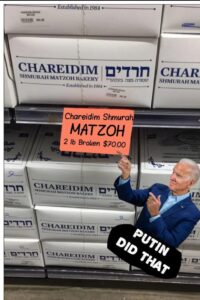
Did I mention 1400 kosher symbols? Surely the heylige Ois is exaggerating, ober check this out from the heylige Internet where one can find kimat everything, though not everything one finds is always emes. “There are well over 1,400 kosher certifying agencies in the world today. As a public service, the Chicago Rabbinical Council presents a list of common acceptable kosher symbols and their agencies’ contact information.” Check out the expanded list here. https://www.crcweb.org/agency_list.php. Well, blow me down. The bottom line: many Toirah inspired entrepreneurs studied this parsha over and again -still do- and many Jews all over the world make a decent living off the RBSO’s orders.
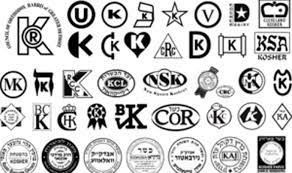
More on kosher another day ober let’s cover the headline of this week’s review: the sudden and instant fire that consumed Nodov and Avihu, Aharoin’s two older sons. Who set it and why? Was it arson? Suspicious? Here’s what went down. On the eighth day (hence the parsha’s name Shmini) of the dedication of the Mishkan, Aharoin, his sons, and the entire nation brought various korbonis (offerings) as commanded by Moishe. It was a happy day for the Yiddin. A project the RBSO had envisioned and designed -one to which four entire parshas are dedicated- was finally completed and open for business. We read that Nodov and Avihu innovated an offering not commanded by the RBSO. What that means, ver veyst? Isn’t innovation good? Anyway, a fire came and consumed them; they’re dead! Aharoin is warned to not mourn them publicly. Can you imagine losing a child and not mourning? Can we even begin to imagine losing two at one time in the same place at the same time? Hashem Yerachem (G-d should have mercy). Ok, what happened here? One-minute Nodov and Avihu were VIPs mamish; they had been called upon to dedicate the Mishkan and bring korbonis. All is good. One posik later, they themselves are burnt offerings?! Amazingly -as we may mention again soon, or not- their clothing remained unsinged. What’s pshat here?
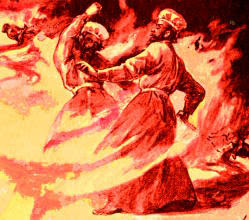
Let’s read that again: says the heylige Toirah (Vayikra 10:1-2), “Now Aharoin’s sons Nodov and Avihu, each took his fire pan, put fire in it, and laid incense on it; and they offered before the Lord alien fire, which He had not enjoined upon them. And fire came forth from the Lord and consumed them; thus they died at the instance of the Lord.” OMG!
Ober, wait just a minute: Isn’t that what they were supposed to do? Wasn’t that their job? What did they do that was so giferlich (terrible) that caused instant punishment by death? Don’t most of us do things daily that are seemingly much worse and we’re still alive? Aren’t we -many times- playing with strange fire, if you chap? What happened next? Moishe called two cousins, Misho’el and Eltzofon to remove the bodies. Why them and not their own brothers? Why not Elozor and Isomor? Can’t a kohain be metapal (be involved) in his own brother’s levaya? Ver veyst? More on them another time, ober let’s see what happened in the aftermath of the tragic fire by reading the very next posik. Then Moishe said to Aharoin: “That is what Hashem [meant when he] said, “Through those near to Me I will be sanctified, and be glorified before all the people.” And Aharoin was silent.
ויקרא י:ג וַיֹּאמֶר מֹשֶׁה אֶל אַהֲרֹן הוּא אֲשֶׁר דִּבֶּר יְ-הוָה לֵאמֹר בִּקְרֹבַי אֶקָּדֵשׁ וְעַל פְּנֵי כָל הָעָם אֶכָּבֵד וַיִּדֹּם אַהֲרֹן.
That’s it? Moishe’s own brother just lost two children -his own nephews- in a fire and Moishe repeats what the RBSO had previously stated? The RBSO stated “through those near to Me, I will be sanctified and be glorified….” Ober we ask azoy: When did the RBSO so state? And to whom was it stated? Where in the entire heylige Toirah can we find these words? Or words resembling the message? No place! Why would Moishe repeat them to Aharoin if he himself never heard them? Was he trying to console Aharoin with this message? What taka did Moishe mean to say? Nu, lest you think that the heylige Ois is mamish a genius for coming up with these givaldige questions, the reality is that a good number of exegetes took notice of Moishe’s words and asked these very questions. Let’s see what a few had to say.
Says Rav Shamshon Rephoel Hirsch (shout out to Richie – Shamshon- Cooperberg) that this transmission to Moishe must have been part of the RBSO’s revelation to Moishe as part of Toirah she-be-al peh (the Oral tradition). In other words: don’t bother looking for where the RBSO told Moishe that He will be honored by those close to him. Those words don’t exist -as they regard the deaths of Nodov and Avihu- and do not appear anywhere in the heylige Toirah. Here is the quote:
“It is difficult to explain [the phrase] “this is what G-d said” for no such thing appears in the Toirah up to this point in which G-d says it… Therefore, it would appear that from here we have a proof that not everything G-d told Moishe appears in the written Toirah. Instead, Moishe only makes reference to it here because of the event that occurred [the deaths of Nodov and Avihu], and as part of telling that story, the Toirah also included this statement. If that had not happened, this statement too would have remained part of the oral Toirah together with many other of G-d’s statements.” Shoin, just in case Shelly Green is fact checking, here it is in Hebrew:
קשה לבאר את הוא אשר דבר ה’; שהרי לא נזכר בתורה עד כה, שה’ אמר כן…. נראה אפוא, שיש גם מכאן ראיה לכך, שלא כל דברי ה’ אל משה נמסרו בתורה שבכתב. אלא שכאן חזר משה על הדברים מחמת המאורע שאירע; ואגב סיפור המאורע – נכתב בתורה גם מאמר זה; אלמלא כן היה גם מאמר זה נשאר בתורה שבעל פה – יחד עם מאמרים רבים אחרים.
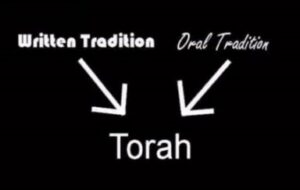
The bottom line: the words spoken by Moishe to Aharoin quoting what the RBSO had previously stated, were not reduced to writing, at least not in the heylige Toirah. Rather, they were spoken to Moishe orally and became part of the oral tradition. Oral is good. Gishmak!
Says the RambaN azoy: we need not assume that G-d never related the statement to Moishe, since the word דבר of the phrase הוא אשר דבר ה’ is best taken in the sense of “said in his heart.” ולדעתי בדרך הפשט אין צורך לכל זה כי דבר השם גזרותיו ומחשבותיו
“In my opinion, according to the pshat, there is no need for all this, for “the word of G-d” refers to his decrees and his thoughts.” Bottom line: Moishe was not referring to something the RBSO told him at some unspecified time in the past. Rather, he was referring to a private, inner decision the RBSO had taken concerning how he would act with his most intimate servants. It was never communicated to anyone -not even to Moishe- but Moishe, upon witnessing their deaths by fire, inferred from the present incident that G-d must have said it “to his heart” at some earlier point in time. Gishmak and according to this pshat, the words were never ever spoken. Does everyone agree? Not! And says the Abarbanel (AKA: Don Abarbanel), azoy:
ונראה לי שאמר זה על מה שנאמר לו בהר סיני, “וגם הכהנים הנגשים אל ה’ יתקדשו פן יפרץ בהם ה’” (שמ’ יט, כב), כי זו היא היתה ההזהרה לענין נדב ואביהו והדומים להם.
Let’s try that in English: “It seems to me that he (Moishe) said this with reference to that which was told to him on Mt. Sinai, “Even the priests who come near to G-d must sanctify themselves lest G-d break out against them” (Shmois 19:22), for this was the warning for the matter of Nodov and Avihu and similar cases. In other words: if Nodov and Avihu were consumed by fire, it’s their own fault: they did not pay heed to the instructions given to Moishe just before the great theophany of Sinai. They were seemingly supposed to sanctify themselves and perhaps did not do so properly, whatever that means. Nice pshat, ober is that what went down? Ober, weren’t those instructions given to Moishe pre-Revelation, pre theophany? Indeed, that’s what the heylige Toirah tells us. The instructions related by the RBSO to Moishe back in Shmois were specifically related to preparation of Matan Toirah (Revelation), and specifically not for the Mishkan which was yet to be at all discussed. How were Nodov and Avihu to know these rules regarding the Mishkan if never told? Moreover, how was the statement made by Moishe “and be glorified before all the people” (ועל פני כל העם אכבד) to be derived from the words spoken in Shmois? The question stands: when and where did the RBSO state to Moishe that He would be honored by those close?
Not fully satisfied with the Abarbanel? Let’s check out his Ibn Ezra who suggests that it is inappropriate to search for a specific posik (verse) in which the RBSO made the statement, and that Moishe was but informing Aharoin of something that G-d had previously related to him, although this is not recorded in the heylige Toirah. In other words: don’t fact-check the RBSO. If Moishe repeated what the RBSO told him, then the conversation took place. Fartig! We take Moishe at his word! And says R. Dovid Zvi Hoffmann azoy: the RambaN (quoted above) already noted that in the Toirah and other places, there are many references to the RBSO’s statements not found explicit in earlier texts. Indeed G-d must have said them, but [the text] never tells us when this occurred. Well, blow me down. Examples of such can also be found in Shmois: 11:4; 16:16, 23:32; check them out.
The bottom line: the RBSO taka said it or thought it earlier, but we don’t know where or when. The heylige Toirah does not record every word of every conversation between the RBSO and Moishe. If Moishe used these words quoting the RBSO, we must assume and believe that Moishe previously heard them. Why the RBSO left them out of His heylige Toirah is none of our business. Shoin and case closed. On the other hand, the Ois found at least four more approaches to the questions posed; those for another year.
Another bottom line: based on all we read above, it appears that Nodov and Avihu were good guys, holy souls whom the RBSO selected as human sacrifices; He felt very close to them as the words spoken by Moishe seem to indicate. Oib azoy (if that’s the case, and seemingly based on big hitters we quoted above and others we left out, it is) why is that many lambasted them and painted them with a guilty brush? Why did many a commentator go out of his or its way to tell us that both Nodov and Avihu were taken out (burnt like a korban) because they had committed serious offenses? That they had it coming? What’s pshat? What dastardly acts does the medrish accuse them of? Let’s see.
Midrash Rabba suggests that the brothers were killed because they were not married and did not have children. Shoin, it’s certainly challenging to have children once dead, ober is being single a capital offense? At what age, does this death sentence kick in? Is it only for Koihanim or all singles? What would the upper West Side would look like if the RBSO wiped out all the singles? Oy vey! More from the medrish: although they were not killed as a result of this situation (inferring they committed other sins), medrish tells us they felt too special to marry just any woman of the community, given their higher status as children of Aharoin, the big Kehunah. Is snobbery so great a sin to warrant the death sentence? Ver veyst? Do all snobs deserve death or only singles? If yes, the Ois has a list to submit.
Rebi Levi says that they were arrogant. Many women remained unmarried waiting for them. How was this arrogance manifested? And how many women was each going to marry? They said: Our father’s brother is a king (Moishe), our mother’s brother is a prince [Nachshon, the Nosi (head of the tribe) of Yehudah], our father is the koihain Godol, and we are both Deputy High Priests; what woman is worthy of us? Another sign of their arrogance… says the heylige Gemora (Sanhedrin 52a) that while Moishe and Aharoin were leading the way at Har Seenai, Nodov and Avihu followed behind them and wondered aloud to one another when Moishe and Aharoin might die so that they could assume the mantle of leadership. The RBSO replied, “We’ll see who will bury who.” Rashi explains that the Gemora is coming to teach that it was for this act of seeking power that they died prematurely. Surely you’re astounded by the Gemora as its shver (difficult) to understand for two reasons. First, the Toirah tells us they died when they brought an offering which they weren’t commanded to bring. Second, nowhere do we find that the pursuit of power is a capital crime. Don’t we all know power hungry koihanim? Aren’t they alive and well?
Rashi quotes Rabbi Eliezer who says that Nodov and Avihu were killed because they rendered a Halachic decision in the presence of Moishe, their teacher. The RambaN, contrary to Rashi’s opinion, says that the mere fact that Nodov and Avihu did not have the proper Kavona (mindset) when they brought the Ketoires (incense) offering was enough to cause the RBSO to kill them. OMG! If a lack of kavona is a capital offense, mistama we’d all be long dead.
Reb Mani, Reb Yehoshua and Rebbe Yoichonon in the name of Reb Levi said azoy: The sons of Aharoin died on account of four things… Because they had drunk wine, as it says [immediately following the incident], “Drink no wine nor strong drink… that you die not” (VaYikra 10:9). Because they served in the Sanctuary lacking the prescribed number of priestly garments (maybe they forgot to put on their gotchkis (underwear) (Shmois 28:43). Because they entered the Sanctuary without washing their hands and feet (Shmois 30:21). Because they had no children… as it says, “And Nodov and Avihu died… and they had no children” (Bamidbar 3:4). Nu, avada many of you can relate to one or more of these logical reasons, I can’t. Others (as quoted by Rashi) say: They already deserved to die at Har Seenai, when they callously feasted their eyes on the Divine (S’hmois 24:9-11). Ober Reb Eliezer ben Yaakov stated (Eruvin 63a; Rashi): The sons of Aharoin died only because they gave a legal decision in the presence of their master Moishe, seemingly also a capital offense.
And check this out: says Rashi (Devorim 9:20) that Nodov and Avihu died because of Aharoin’s participation and leadership role in the crafting of the Eygel (Golden Calf), as it is written: “And against Aharoin did G-d verily rage to destroy him; and I prayed also for Aharoin at that time.” Moishe’s prayer was halfway effective; two brothers died and two remained alive.
The bottom line: seemingly these two fellows were doomed: ‘dead men walking’ for some time and the rationales offered for their demise ranges greatly. Sadly, many paint them ugly and deserving of death. Why? Ver veyst? That being said, did anyone have a nice word to say about these two poor souls? Yes! Says the Zoihar -we don’t ever argue with the Zoihar- that he was a shtikel perplexed with their deaths because according to him both Nodov and Avihu were under the age of twenty when they died. Since their deaths were a punishment by heavenly means, a difficulty arises; their deaths violate the accepted rule that the heavenly court does not mete out punishment to anyone under twenty years of age. Takah shver tzu farshtein (difficult to understand).
The good news: We conclude with the Ohr Hachaim who shines a much brighter light on them and says azoy: They came close to G-d and died –they approached the supernal light out of their great love of the Holy, and thereby died. Thus, they died by “divine kiss” such as experienced by the perfectly righteous. Only the righteous die when the divine kiss approaches them. Nodov and Avihu died by approaching it… Although they sensed their own demise, this did not prevent them from drawing near to the RBSO in attachment, delight, delectability, fellowship, love, kissing and sweetness, to the point that their souls ceased from them. Says the Ois: that’s how they should be remembered.
The final bottom line: the heylige Ois would like to believe that Nodov and Avihu were indeed good guys, they did not sin, but were selected by the RBSO for sanctification. How that works and why, ver veyst? Perhaps we’re better off not knowing too much; our job is to believe.
A gittin Shabbis-
The Heylige Oisvorfer Ruv
Yitz Grossman
